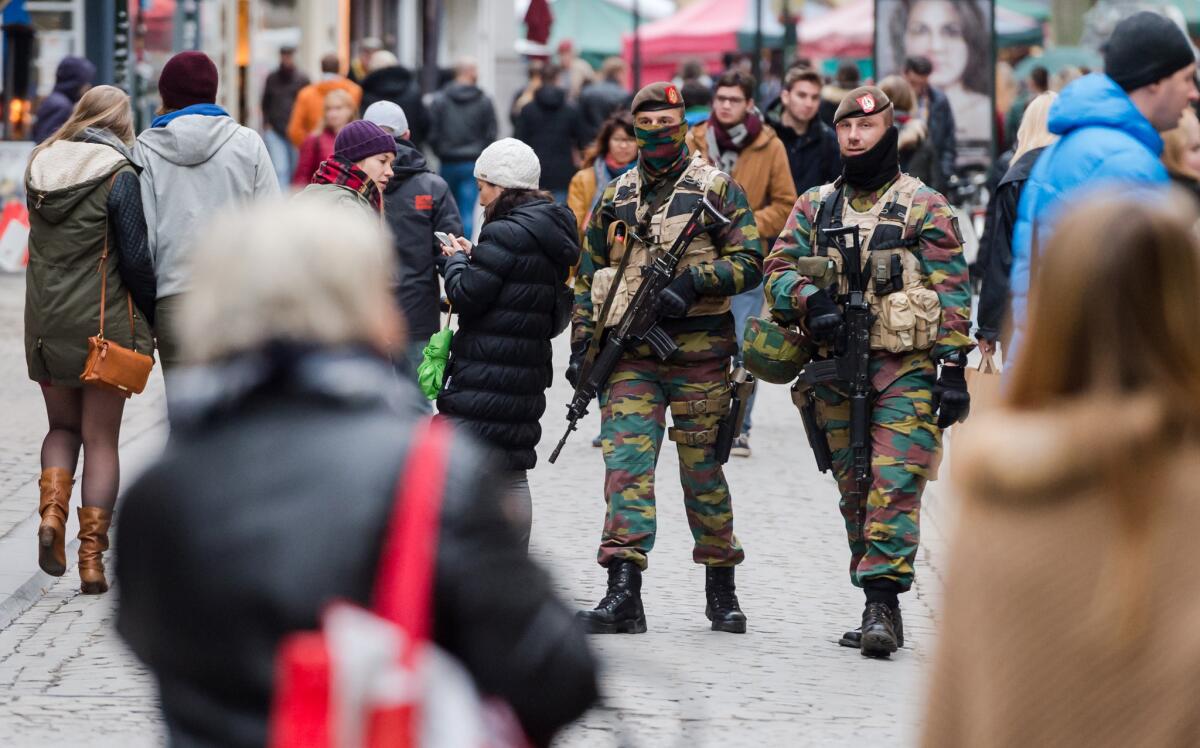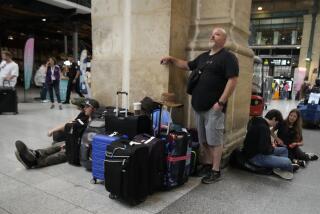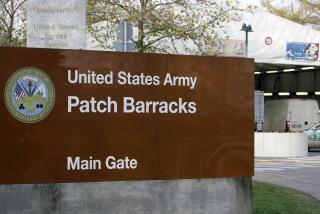Belgium raises threat alert to highest level after Paris attacks

Belgian soldiers patrol in the picturesque Grand Place in Brussels.
reporting from BRUSSELS — Heavily armed police and soldiers patrolled key intersections, subways were closed and many stores shut their doors in Belgium’s capital Saturday as the government warned of a threat of Paris-style attacks. At least one suspect from the deadly Paris attacks is at large and was last seen crossing into Belgium.
Prime Minister Charles Michel said the decision to raise the threat alert to the highest level was taken “based on quite precise information about the risk of an attack like the one that happened in Paris ... where several individuals with arms and explosives launch actions, perhaps even in several places at the same time.”
The Belgian Federal Prosecutor’s office said Saturday that several weapons were discovered during the search of the home of one of three people arrested in connection with the Paris attacks, but that no explosives were found.
NEWSLETTER: Get the day’s top headlines from Times Editor Davan Maharaj >>
Authorities across Europe, the Mideast and in Washington are trying to determine how a network of primarily French and Belgian attackers with links to Islamic extremists in Syria plotted and carried out the deadliest violence in France in decades — and how many may still be on the run.
A new potential link emerged Saturday in Turkey, where authorities said they detained a 26-year-old Belgian suspected of connections to Islamic extremists — and possibly to the Paris attacks. The private Dogan news agency identified him as Ahmet Dahmani and said he is suspected of having explored areas in Paris that were targeted in the attacks.
Belgium’s national Crisis Center has raised its terrorism alert for the Brussels region to Level 4, which indicates a “serious and immediate threat.” Belgium’s special security Cabinet held an emergency meeting Saturday morning.
Brussels was the home of Abdelhamid Abaaoud, the suspected organizer of the Nov. 13 Paris attacks, and Belgium has filed charges of “participation in terrorist attacks and participation in the activities of a terrorist organization” against three suspects relating to the Paris attacks.
At least one Paris attacker, Salah Abdeslam, crossed into Belgium the morning after the attacks. A Paris police official and the Paris prosecutor’s office said Saturday they had no firm information on Abdeslam’s whereabouts, including whether he was in the Brussels area.
Heavily armed police and soldiers patrolled Saturday morning at key intersections of the Belgian capital, a city of more than 1 million that is home to the headquarters of the European Union, the NATO alliance and offices of many multinational corporations.
Residents were recommended to avoid gatherings, train stations, airports and commercial districts. Service was halted on the Brussels Metro, as well as on streetcar lines that run underground.
As the first snow flurries of the season fell, many stores and commercial centers in the capital shut their doors on what normally would have been a busy weekend shopping day in the lead-up to the Christmas and New Year’s holidays. The Royal Museums of Fine Arts of Belgium closed for the weekend, and a Saturday evening concert by French rocker Johnny Hallyday was rescheduled for March, the Palais 21 venue announced on its website.
Brussels Airport, which is not in the Brussels administrative region, reported normal operations Saturday, but external communications manager Florence Muls said special attention was being paid to security.
The prime minister, speaking at a news conference after the emergency government meeting, said, “We urge the public not to give in to panic, to stay calm. We have taken the measures that are necessary.”
He said that the government’s crisis cell will meet again Sunday afternoon to reassess the threat.
Dahmani was detained in the Turkish coastal city of Antalya along with two other suspected Islamic State militants. A senior Turkish government official said Dahmani was believed to have been in contact with the Paris attackers, though the official did not say when. Dahmani had arrived in Turkey on Nov. 14 from Amsterdam, and the three were preparing to cross into Syria, the official said.
The official cannot be named because of Turkish government rules that bar officials from speaking to reporters without prior authorization.
The Belgian Federal Prosecutor’s Office said he could not comment on Dahmani’s detention or disclose any information about him. A Paris police official said he had no information about Dahmani or his possible visit to the attack sites. The Paris prosecutor’s office said it had no information to communicate about Dahmani.
Concerns about Europe’s porous borders prompted interior and justice ministers meeting in Brussels on Friday to promise tightened controls to make it easier to track the movements of jihadis with European passports traveling to and from warzones in Syria.
Paris prosecutors said Friday that they had determined through fingerprint checks that two of the seven attackers who died in the bloodshed Nov. 13 had entered Europe through Greece, an entry point for many of the hundreds of thousands of migrants seeking asylum in Europe.
The five other attackers who died had links to France and Belgium. One of the seven dead has not been identified, while a manhunt is underway for one suspect who escaped, 26-year-old Abdeslam. French police stopped Abdeslam the morning after the Paris attacks at the Belgian border but then let him go. His brother Brahim blew himself up in Paris.
The suspected ringleader, Abdelhamid Abaaoud, was killed in a raid Wednesday on an apartment in the Paris suburb of Saint-Denis. Seven of the eight people detained in that raid have been released, the Paris prosecutor’s office said Saturday. The eighth person still in custody, Jawad Bendaoud, said in televised remarks during the siege that he let people stay in the raided apartment as a favor and “didn’t know they were terrorists.”
Marking a week since the carnage, some Parisians lit candles and paid tribute Friday night to the victims with silent reflection. Others decided that enjoying themselves was the best way to defy the extremists. They sang and danced on Place de la Republique, in the heart of a trendy neighborhood where scores of people were killed.
France’s Parliament has extended a state of emergency for three months, expanding police powers to carry out arrests and searches and allowing authorities to forbid the movement of persons and vehicles at specific times and places. On Saturday, Paris police also extended a ban on demonstrations and other gatherings through Nov. 30, when a U.N. climate conference with more than 100 heads of state is scheduled to start.
French President Francois Hollande is meeting with British Prime Minister David Cameron on Monday morning in Paris to discuss cooperation in the fight against the Islamic State group in Syria and Iraq, Cameron’s office said. Hollande will travel to Washington and Moscow later in the week to push for a stronger international coalition against Islamic State.
ALSO
France seeks U.S.-Russia unity in coalition against Islamic State
Obama says Mali attack stiffens resolve against terrorism
Opinion: Hollande’s war talk gives Islamic State what it wants most
More to Read
Sign up for Essential California
The most important California stories and recommendations in your inbox every morning.
You may occasionally receive promotional content from the Los Angeles Times.










